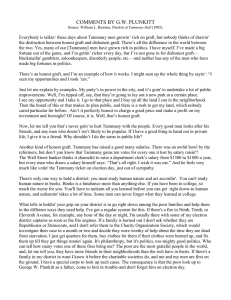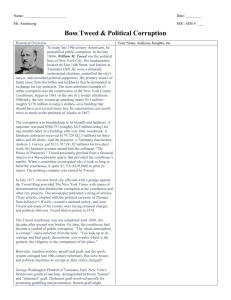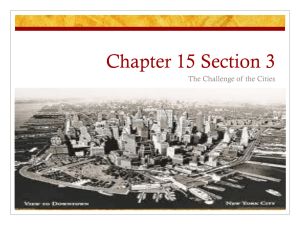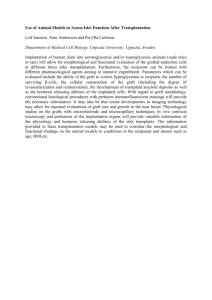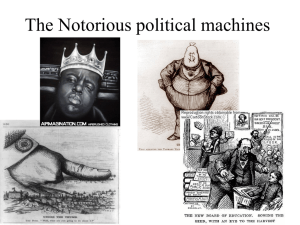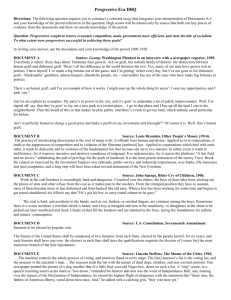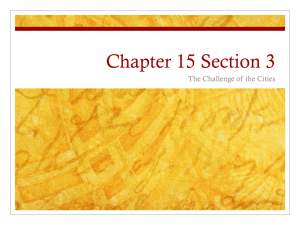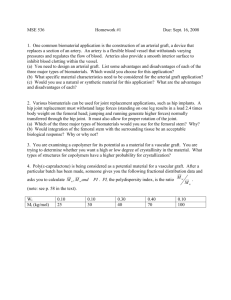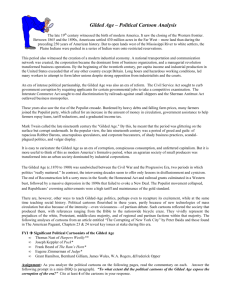Politics of the Gilded Age (11-12)
advertisement
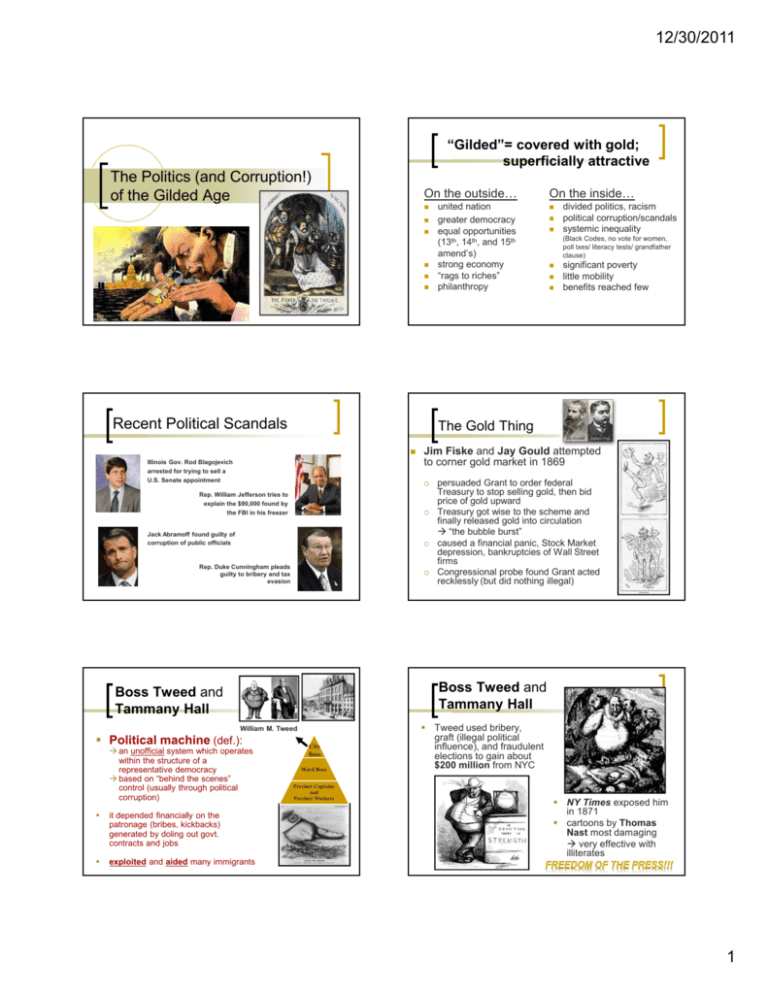
12/30/2011 “Gilded”= covered with gold; superficially attractive The Politics (and Corruption!) of the Gilded Age On the outside… Recent Political Scandals united nation greater democracy equal opportunities (13th, 14th, and 15th amend’s) strong economy “rags to riches” philanthropy On the inside… divided politics, racism political corruption/scandals systemic inequality (Black Codes, no vote for women, poll txes/ literacy tests/ grandfather clause) significant poverty little mobility benefits reached few The Gold Thing Illinois Gov. Rod Blagojevich arrested for trying to sell a U.S. Senate appointment Jim Fiske and Jay Gould attempted to corner gold market in 1869 Rep. William Jefferson tries to explain the $90,000 found by the FBI in his freezer Jack Abramoff found guilty of corruption of public officials Rep. Duke Cunningham pleads guilty to bribery and tax evasion persuaded Grant to order federal Treasury to stop selling gold, then bid price of gold upward Treasury got wise to the scheme and finally released gold into circulation “the bubble burst” caused a financial panic, Stock Market depression, bankruptcies of Wall Street firms Congressional probe found Grant acted recklessly (but did nothing illegal) Boss Tweed and Tammany Hall Boss Tweed and Tammany Hall William M. Tweed Political machine (def.): an unofficial system which operates within the structure of a representative democracy based on “behind the scenes” control (usually through political corruption) it depended financially on the patronage (bribes, kickbacks) generated by doling out govt. contracts and jobs exploited and aided many immigrants City Boss Ward Boss Precinct Captains and Precinct Workers Tweed used bribery, graft (illegal political influence), and fraudulent elections to gain about $200 million from NYC NY Times exposed him in 1871 cartoons by Thomas Nast most damaging very effective with illiterates 1 12/30/2011 Boss Tweed and Tammany Hall Other Editorial Cartoons George Plunkitt - “Honest Graft” I’ve made a big fortune out of the game, and I’m gettin’ richer every day, but I’ve not gone in for dishonest graft—blackmailin' gamblers, saloonkeepers, disorderly people, etc. There’s an honest graft, and I’m an example of how it works. I might sum up the whole thing by sayin‘: “I seen my opportunities and I took ’em.” Credit Mobilier Scandal (1872) Just let me explain by examples. My party’s in power in the city, and it’s goin' to undertake a lot of public improvements. Well, I’m tipped off, say, that they’re going to lay out a new park at a certain place. I go to that place and I buy up all the land I can in the neighborhood. Then the board of this or that makes its plan public, and there is a rush to get my land, which nobody cared particular for before. insiders of the Union Pacific Railway formed their own railroad construction company hired themselves to build the R.R. and paid themselves huge fees distributed shares of stock to congressmen to avoid interference Ain’t it perfectly honest to charge a good price and make a profit on my investment and foresight? Of course, it is. Well, that’s honest graft. Whiskey Ring Scandal (1875) Credit Mobilier (cont’d) Congressional investigation led to censure of two members & the V.P. o Grant’s reputation tarnished (though most corruption occurred before his presidency) the press revealed a “Whisky Ring” had robbed millions in excise-tax revenues Justice (to the Saints of the Press). "Let him that has not betrayed the trust of the People, and is without stain, cast the first stone." Pres. Grant: "Let no man escape” one of Grant’s cabinet members part of the scam Grant persuaded the jury not to convict 2 12/30/2011 Indian Supply Scandal (1876) Election of 1876 “Third Term” (the bar) Grant’s Sec. of War pocketed $24,000 for selling “the privilege of disbursing supplies to Indians” “Corruption” the supplies were often worthless The House of Representatives voted to impeach him and he resigned the same day Sec. of War William Belknap “Puck wants a ‘strong man at the head of government’ –but not this kind.” Republican Factions Document SKILL (activity) (1870s-1880s) Stalwarts Half-Breeds o led by Sen. Roscoe Conkling (NY) favored spoils system o Sen. James G. Blaine (ME) claimed to favor civil service reform (though that was questionable!) o o Document A “The ‘Great American Game of Public Office for Private Gain” Thomas Nast Harper's Weekly 1884 How did politicians live under the shadow of Ulysses Grant’s presidency from 1876 to 1896? Document B “Everybody is talking these days about Tammany men growing rich on graft, but nobody thinks of drawing the distinction between honest graft and dishonest graft. There’s all the difference in the world between the two. Yes, many of our men have grown rich in politics. I have myself. I’ve made a big fortune out of the game and I’m getting richer every day, but I’ve not gone for dishonest graft – blackmailing gamblers, saloonkeepers, disorderly people, etc. – and neither has any of the men who have made big fortunes in politics. “…My party’s in power in the city, and it’s goin' to undertake a lot of public improvements. Well, I, tipped off…I see my opportunity and I take it. I go to the place and I buy up all the land I can in the neighborhood… Ain’t it perfectly honest to charge a good price and make a profit on my investment and foresight? Of course, it is. Well, that’s honest graft.” - George Plunkitt 3 12/30/2011 Sample Thesis “The scandals of the Grant administration made honesty in government a dominant political issue for an entire generation.” What do you think?? Sample Paragraph “After the scandals of the 1870s, the voters demanded honesty from their political leaders. When James Blaine ran in 1884, he was portrayed as an imposter who tried to fool the people into believing he was a crusader or “Plumed Knight.” In fact, he had used his office for private gain. (Doc A.)” Sample Paragraph (cont’d) “Moreover, some political bosses tried to justify their misdeeds by saying there was difference between honest graft, which involved using insider information and did not hurt anyone specifically, and dishonest graft, which was practiced by those officials who took pay offer from saloon keepers and gamblers; however, the voters rejected this distinction and demanded politicians protect the public interest rather than enrich themselves, as seen in the tremendous public sentiment against Boss Tweed (Doc B).” 4

